Global reaction to energy crisis risks zero carbon transition
Attachments
Summary
The world is going through a major energy crisis as a result of Russia’s invasion of Ukraine. At the same time, the next few years are critical for climate action—a last chance to keep the 1.5°C temperature limit within reach.
So far, governments have largely failed to seize their chance to rearrange their energy supplies away from fossil fuels. Instead, we are witnessing a global “gold rush” for new fossil gas production, pipelines and liquefied natural gas (LNG) facilities. This risks locking us into another high-carbon decade and keeping the Paris Agreement’s 1.5°C limit out of reach.
The do’s and don’ts of energy crisis response
The table below contains a synthesis of good and bad practices that we have found in our analysis of government action in response to the global energy crisis.
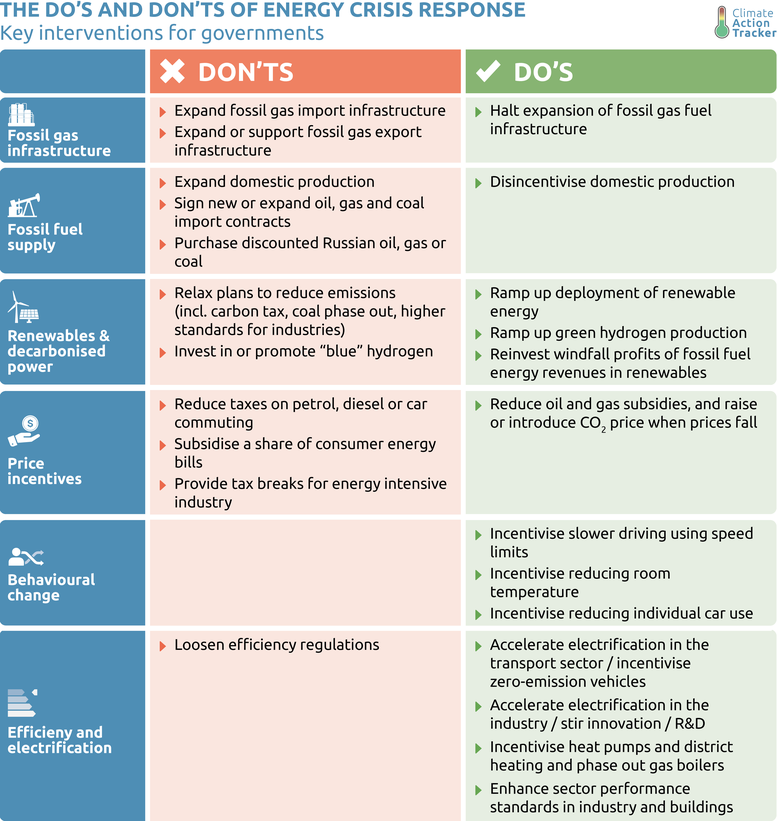
Fossil gas production and infrastructure
Fossil gas production and infrastructure expansion is planned around the globe with the argument to replace Russian gas.
- New planned LNG import facilities in the EU—especially in Germany, Italy, Greece and the Netherlands—could supply a quarter more gas to the EU than before.
- Canada plans to fast track new LNG projects to increase exports.
- The US has signed a deal to export additional LNG to the EU. Qatar and Egypt have signed similar deals with Germany and Italy, respectively. Algeria has signed a deal to export additional gas via pipeline to Italy.
- In Africa, old gas pipeline projects are being revived (e.g. Nigeria) and countries with previously no fossil gas exports (e.g. Senegal) are now encouraged to supply gas to Europe.
- Domestic fossil fuel production has increased in the US, Canada, Norway, Italy and Japan, and new long-term import contracts are closed or extended in the UK, EU, Germany, Poland and Italy.
If all these plans materialise, they will either end up as massive stranded assets or they’ll lock the world into irreversible warming.
Governments set to repeat the same mistakes
After failing to focus on climate during COVID-19 recovery, many governments look set to make the same mistake in the face of a global energy shock. Governments largely failed to make decarbonisation a focus in their post-pandemic economic recovery packages, with only a small fraction of the billions spent dedicated to accelerating the energy transition to bring down emissions. Instead, they missed a massive opportunity, spending the lion’s share of those packages on maintaining the status quo. According to our analysis, governments are making the same mistake, twice over.
Renewables and green hydrogen
Whilst in some places renewables and green hydrogen expansion have been accelerated by several years, this is far from sufficient. A few governments have increased their plans for renewables as reaction to the crisis. The EU and UK have made proposals to increase their renewable energy targets. In most cases, however, this still falls short of the increase needed — or indeed what is possible. Contracts for the delivery of green hydrogen have been closed, a development that was previously foreseen as not happening for at least five years, if not longer.
Price incentives
Across the board, governments are compensating consumers for high energy bills, but many support fossil fuel-intensive behaviour. Almost all governments surveyed are compensating consumers and industry for high energy prices. Many governments are providing flat-rate tax cuts for petrol and diesel for all of industry as in Sweden, US (individual states), Japan, Korea, Austria, Germany, Poland, Czech Republic, Croatia, Italy, Spain, Portugal, New Zealand, Netherlands and France.
When energy prices begin dropping again, governments should take the opportunity to reduce fossil fuel subsidies or increase carbon pricing, both of which would drive down emissions. Decreasing energy prices would be a perfect moment to reduce fossil fuel subsidies or introduce/increase a carbon tax. It is more acceptable for consumers as it would lead to a slower price decrease, not a price increase. So far only Denmark has done so.
Taxing fossil fuel windfall profits
The currently high fuel prices are seeing fossil fuel companies making record profits. Only a few governments have begun taxing fossil fuel companies on these additional profits (Italy, Spain, Bulgaria, Romania, UK). The EU provides a structure as to how it could be done, which could be rolled out to more countries. Additional revenue could be used to compensate those in need, or to expand renewables and energy efficiency.
Governments don't support behavioural change
Immediate and low-cost options to reduce energy demand and therefore the need for Russian fossil fuels would include shifts in behaviour, such as encouraging slower driving by introducing/lowering speed limits, home office policies, restricting car access to cities, or turning down the heating in buildings. These options still seem to be very unattractive to governments: we have only found governments recommending their population to those behavioural shifts and few incentivising it. So far only New Zealand, US (California), Italy, Germany and Ireland have introduced new incentives for public transport.
Energy efficiency and electrification needed
We find only a few countries putting additional emphasis on energy efficiency and/or electrification as a reaction to the current crisis. A push for heat pumps, electric cars, electrification in industry would be an adequate reaction, but is currently underdeveloped (EU, UK, Japan).
How are governments reacting?
Government reactions to the energy crisis caused by Russia could determine whether they enter another decade of high carbon development or set themselves on a path toward decarbonising their economies, limiting global warming to 1.5°C, as the IPCC has firmly recommended.
Our analysis shows that government responses largely address the short-term energy supply needs and compromise their long-term climate mitigation strategies. Based on recently-passed legislation and government announcements, we identified measures that governments should take to secure a continuous sustainable energy supply and reduce their overall energy demand, who is taking them, and who is not.

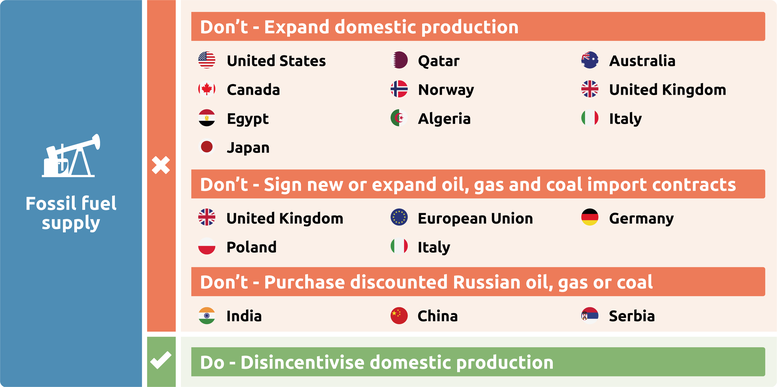
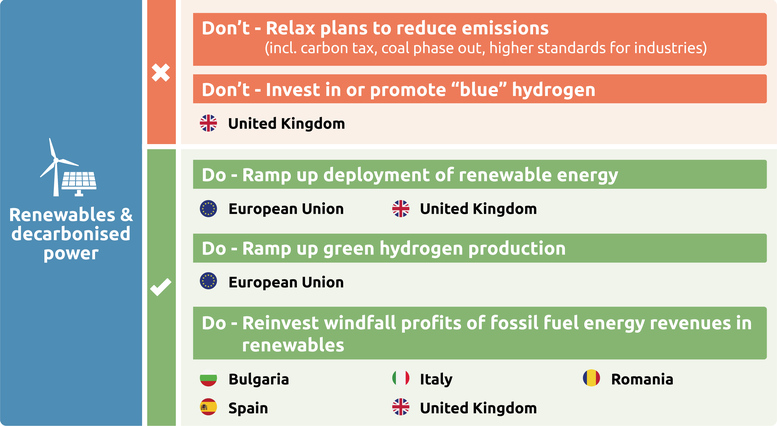
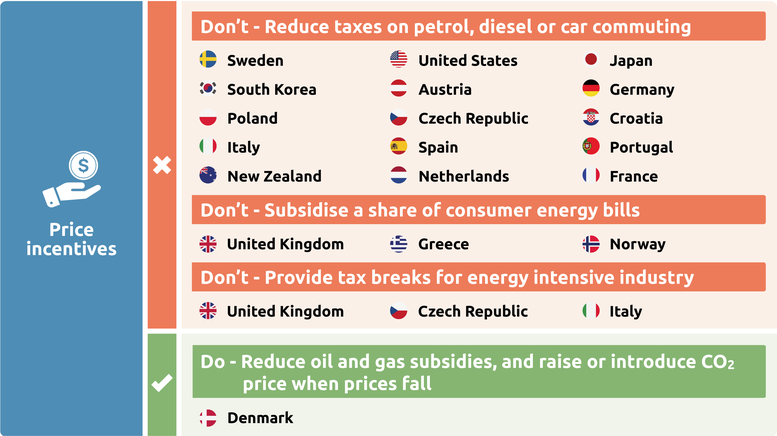

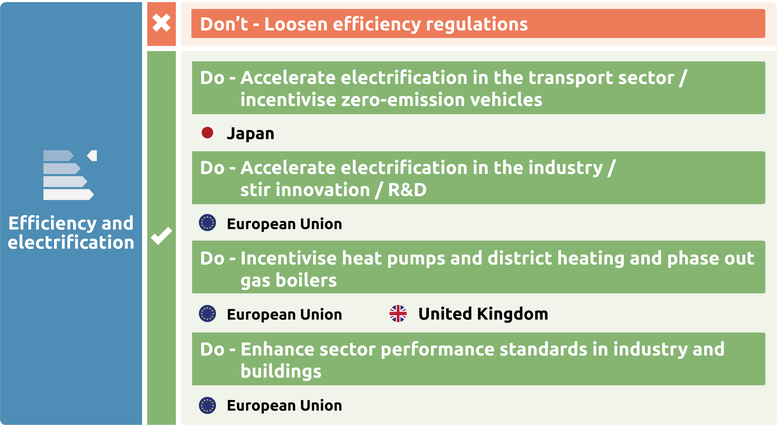
Find out more
To find out more, please read the full briefing by clicking the button below or alternatively you can view the press conference. You can also find our latest country assessments here. You can also read our latest briefing on the progress on new, more ambitious 2030 climate targets and participation in sectoral initiatives that was promised by countries during COP26 in Glasgow.
Stay informed
Subscribe to our newsletter